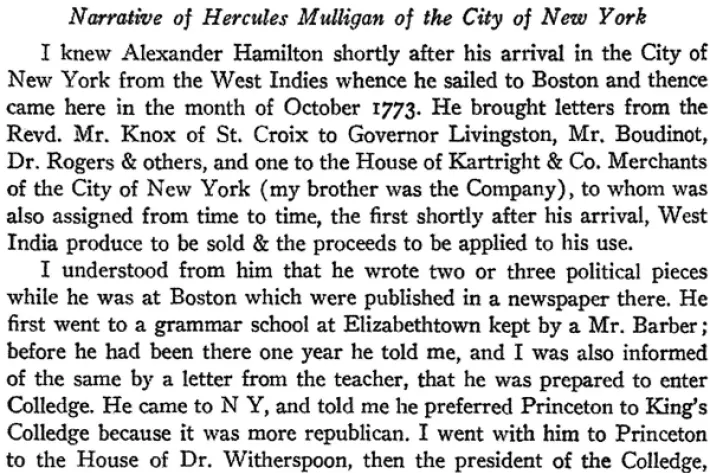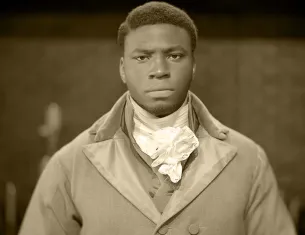Hercules Mulligan Writes about Meeting Alexander Hamilton, ca. 1810

The Narrative of Hercules Mulligan of the City of New York (Alexander Hamilton Papers, Library of Congress)
Years after Hamilton’s death, Hercules Mulligan wrote about his friendship with Alexander Hamilton. In this section of his narrative, Hercules Mulligan describes Hamilton’s education at Elizabethtown, New Jersey, and King’s College (now Columbia University). Historians have noted that some of Mulligan’s dates and events do not match other reports from the time.
The Narrative of Hercules Mulligan of the City of New York, ca. 1810–1815
[Excerpt] I knew Alexander Hamilton shortly after his arrival in the City of New York from the West Indies whence he sailed to Boston and thence came here in the month of October 1773. He brought letters from the Revd. Mr. Knox of St. Croix to Governor Livingston, Mr. Boudinot, Dr. Rogers & others, and one to the House of Kartright & Co. Merchants of the City of New York (my brother was the Company), to whom was also assigned from time to time, the first shortly after his arrival, West India produce to be sold & the proceeds to be applied to his use. I understood from him that he wrote two or three political pieces while he was at Boston which were published in a newspaper there. He first went to grammar school at Elizabethtown kept by a Mr. Barber; before he had been there one year he told me, and I was also informed of the same by a letter form the teacher, that he was prepared to enter Colledge. He came to N Y, and told me he preferred Princeton to King’s Colledge because it was more republican. I went with him to Princeton to the house of Dr. Witherspoon, then the president of the Colledge, with whom I was well acquainted, and I introduced Mr. Hamilton to him and proposed to him to Examine the young gentleman which the doctor did to his entire satisfaction. Mr. Hamilton then stated that he wished to enter either of the classes to which his attainments would entitle him but with the understanding that he should be permitted to advance from Class to Class with as much rapidity as his exertions would enable him to do. Dr. Witherspoon listened with great attention to so a unusual from so young a person and replied that he had not the sole power to determine but that he would submit request to the trustees who would decide, which was done & in about a fortnight after a letter was received from the President stating that the request could not be complied with because it was contrary to the useage of the Colledge and expressing his regret because he was convinced that the young gentleman would do honor to any seminary at which he should be educated He entered King’s (now Columbia) Colledge in the spring of 75 in the Sophomore Class & on the terms he had proposed at Princeton and boarded with my family. . . . Document Source: William and Mary Quarterly
Narrative of Hercules Mulligan of the City of New York, ca. 1810-1815
I knew Alexander Hamilton shortly after his arrival in the City of New York from the West Indies whence he sailed to Boston and thence came here in the month of October 1773 . . .
He first went to grammar school at Elizabethtown . . . and I was also informed of the same by a letter from the teacher, that he was prepared to enter Colledge. He came to N Y, and told me he preferred Princeton to King’s Colledge because it was more republican. I went with him to Princeton to the house of Dr. Witherspoon, then the president of the Colledge, with whom I was well acquainted, and I introduced Mr. Hamilton to him and proposed to him to Examine the young gentleman which the doctor did to his entire satisfaction. Mr. Hamilton then stated that he wished to enter either of the classes to which his attainments would entitle him but with the understanding that he should be permitted to advance from Class to Class with as much rapidity as his exertions would enable him to do . . . in about a fortnight after a letter was received from the President stating that the request could not be complied with . . .
He entered King’s (now Columbia) Colledge in the spring of 75 in the Sophomore Class & on the terms he had proposed at Princeton and boarded with my family.
While in Colledge he joined a volunteer uniform company . . . I recollect well that Mr. Hamilton was there, for I was engaged in hauling off one of the Cannons, when Mr. H came up and gave me his musket to hold, & he took hold of the rope . . . Hamilton at the first firing was away with Cannon. I left his musket in the Battery & retreated, as he was returning I met him and he asked for his piece. I told him where I had left it, and he went for it, notwithstanding the firing continued, with as much unconcern as if the vessel had not been there . . .
Document Source: William and Mary Quarterly
whence: from where
republican: a person who favors a republic form of government where supreme power is held by the people through elected representatives
Background
Years after Hamilton’s death, Hercules Mulligan wrote about his friendship with Alexander Hamilton. In this section of his narrative, Hercules Mulligan describes Hamilton’s education at Elizabethtown, New Jersey, and King’s College (now Columbia University). Historians have noted that some of Mulligan’s dates and events do not match other reports from the time.
Transcript
The Narrative of Hercules Mulligan of the City of New York, ca. 1810–1815
[Excerpt] I knew Alexander Hamilton shortly after his arrival in the City of New York from the West Indies whence he sailed to Boston and thence came here in the month of October 1773. He brought letters from the Revd. Mr. Knox of St. Croix to Governor Livingston, Mr. Boudinot, Dr. Rogers & others, and one to the House of Kartright & Co. Merchants of the City of New York (my brother was the Company), to whom was also assigned from time to time, the first shortly after his arrival, West India produce to be sold & the proceeds to be applied to his use. I understood from him that he wrote two or three political pieces while he was at Boston which were published in a newspaper there. He first went to grammar school at Elizabethtown kept by a Mr. Barber; before he had been there one year he told me, and I was also informed of the same by a letter form the teacher, that he was prepared to enter Colledge. He came to N Y, and told me he preferred Princeton to King’s Colledge because it was more republican. I went with him to Princeton to the house of Dr. Witherspoon, then the president of the Colledge, with whom I was well acquainted, and I introduced Mr. Hamilton to him and proposed to him to Examine the young gentleman which the doctor did to his entire satisfaction. Mr. Hamilton then stated that he wished to enter either of the classes to which his attainments would entitle him but with the understanding that he should be permitted to advance from Class to Class with as much rapidity as his exertions would enable him to do. Dr. Witherspoon listened with great attention to so a unusual from so young a person and replied that he had not the sole power to determine but that he would submit request to the trustees who would decide, which was done & in about a fortnight after a letter was received from the President stating that the request could not be complied with because it was contrary to the useage of the Colledge and expressing his regret because he was convinced that the young gentleman would do honor to any seminary at which he should be educated He entered King’s (now Columbia) Colledge in the spring of 75 in the Sophomore Class & on the terms he had proposed at Princeton and boarded with my family. . . . Document Source: William and Mary Quarterly
Excerpt
Narrative of Hercules Mulligan of the City of New York, ca. 1810-1815
I knew Alexander Hamilton shortly after his arrival in the City of New York from the West Indies whence he sailed to Boston and thence came here in the month of October 1773 . . .
He first went to grammar school at Elizabethtown . . . and I was also informed of the same by a letter from the teacher, that he was prepared to enter Colledge. He came to N Y, and told me he preferred Princeton to King’s Colledge because it was more republican. I went with him to Princeton to the house of Dr. Witherspoon, then the president of the Colledge, with whom I was well acquainted, and I introduced Mr. Hamilton to him and proposed to him to Examine the young gentleman which the doctor did to his entire satisfaction. Mr. Hamilton then stated that he wished to enter either of the classes to which his attainments would entitle him but with the understanding that he should be permitted to advance from Class to Class with as much rapidity as his exertions would enable him to do . . . in about a fortnight after a letter was received from the President stating that the request could not be complied with . . .
He entered King’s (now Columbia) Colledge in the spring of 75 in the Sophomore Class & on the terms he had proposed at Princeton and boarded with my family.
While in Colledge he joined a volunteer uniform company . . . I recollect well that Mr. Hamilton was there, for I was engaged in hauling off one of the Cannons, when Mr. H came up and gave me his musket to hold, & he took hold of the rope . . . Hamilton at the first firing was away with Cannon. I left his musket in the Battery & retreated, as he was returning I met him and he asked for his piece. I told him where I had left it, and he went for it, notwithstanding the firing continued, with as much unconcern as if the vessel had not been there . . .
Document Source: William and Mary Quarterly
whence: from where
republican: a person who favors a republic form of government where supreme power is held by the people through elected representatives
